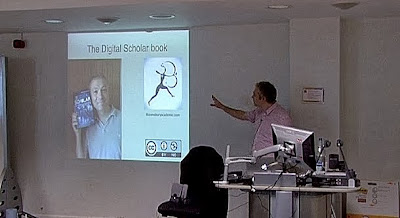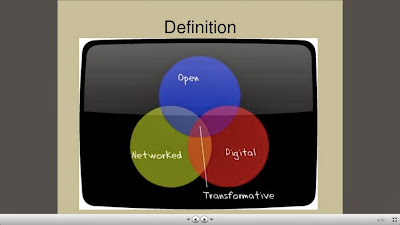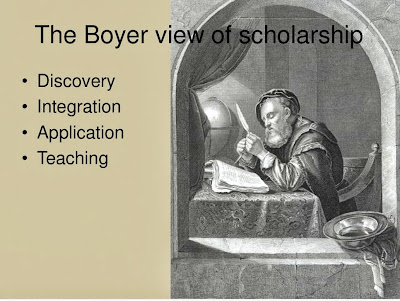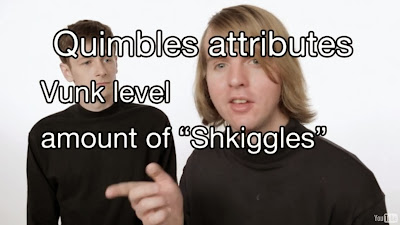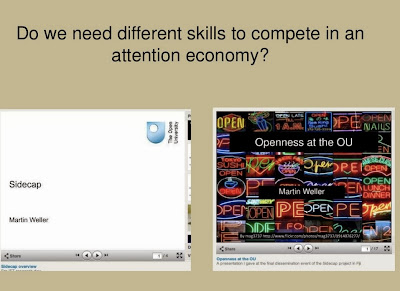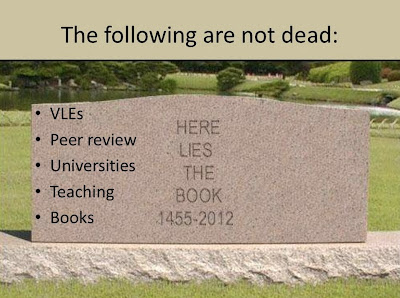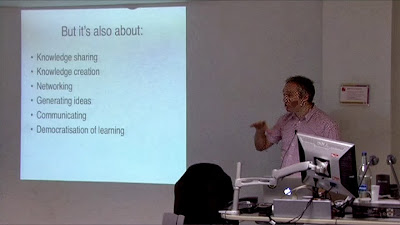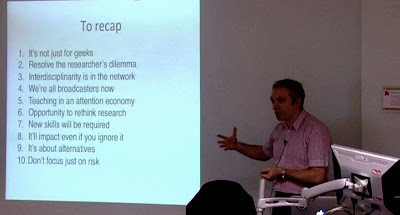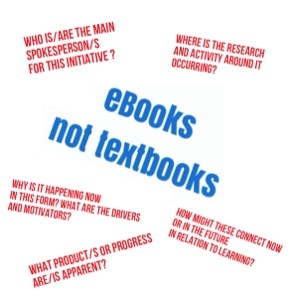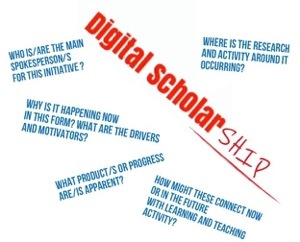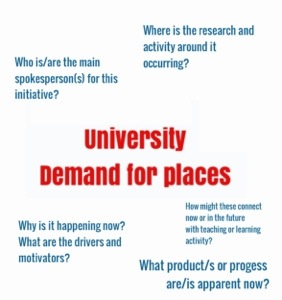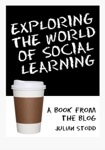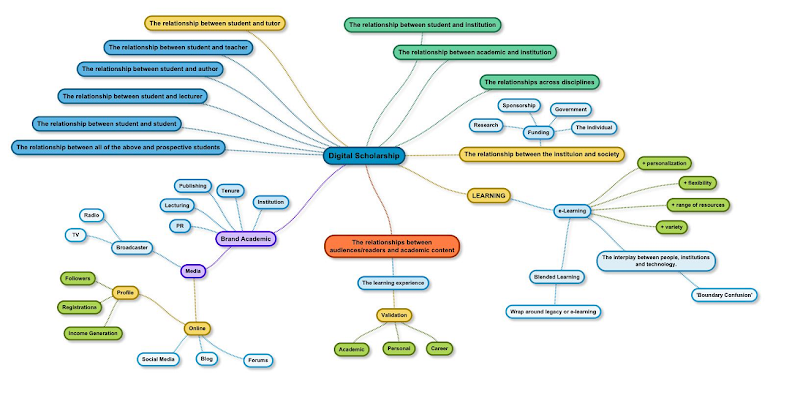An avalanche is coming: Higher education and the revolution ahead
An Avalanche is Coming (not)
No it isn't, or rather - no more than at any specific location around our digital universe. And the idea of a revolution is ludicrous. Do we expect to see guns in schools? (US of A excepted).
Pearson Education want to scare us. This paper is doing the rounds and courtesy of is sensationalist title and its massive quoting of the press in its construction then it will get ample press coverage. Most in academic institutions, some years ago, realised that the change, would be more akin to melting glaciers. Not even of the climate change variety.
I've got an essay crisis on at the moment.
The module is Practice-based research in e-learning with the OU.
The first block and the last five weeks has been spent learning how to review literature so that you feel the authors are credible and the subject has been treated in an objective way with research that is empirically based. There are academic papers and books on the likely or potential changes to Tertiary Education, such as:
- 'Rethinking University Teaching: A conversational framework for effective use of educational technology', Diana Laurillard
- 'Contemporary Perspectives in E-Learning Research: Themes, Methods and Impact on Practice' Grainne Conole
- 'Preparing for Blended e-learning' Allison Littlejohn
- 'Rethinking Pedagogy for a Digital Age' Helen Beetham
- 'The Digital Scholar: How Technology is Transforming Scholarly Practice'
I have read all of these and am currently reading 'Teenagers and Technology (Adolescence and Society' Chris Davies and Rebecca Eynon which took me to her paper 'Mapping the Digital Divide in Britain: Implications for Learning and Education'.
My sober response to this 'paper' starts with the title.
We should read anything with a sensationalist title with great caution. There are two traps that journalists fall into, or exploit, either to say there is revolution or to say that disaster looming. The sober, academic, empirically researched view is often far more contained, less exciting and so less inclined to gain press attention for its authors - in this case Pearson.
I'm up at 4.15 to write an assignment where I have had to put forward five papers and argue for their inclusion to help me get to the bottom of a research question.
I've read three books, reviewed some 60 and read some 20 papers at least to get this far. The research question is set in Tertiary Education.
In the last month I have been to both University of Southampton and University of Oxford - I don't for example, see Balliol College, Oxford, marking its 750th Anniversary this year, changing that radically. The model works too well, indeed, if anything, the Internet will make these institutions more appealing to students. Indeed I spent over an hour on the phone to a second year English Literature Student last night - from Perth in Western Australia, clearly very bright and motivated. She described how she Googled 'English Literature', found the top universities, then chose the one of the leading Colleges at Oxford.
My alarm bells start to go when a forward is written by 'emeritus' - however amazing their career has been, they have retired and their choice may be for PR reasons.
Excuse the cynic in me.
Are the other two authors, employees of Pearson, learning academics? Neither.
Then I turn to the bibliography and I find pages of citations ... for journalists.
In my experience of the last three years of a Masters course in E-learning I have learnt that very few journalists should ever be read on the subject as they always have an agenda - the bias of their paper, the need to sell papers, and the need to sell themselves. What struck me is that NOT ONE of the leading academic figures on the shifts that are inevitable to tertiary education are mentioned here, the names I have given above you may notice, were mostly figures from the OLDS MOOC by the way.
I will read and try to offer a balanced review in due course but fear that the response that it usually elicits in me is the same as the sensationalist titles of these things.
In this case, if its snow then wait for spring and the problem will go away ... and what about all those countries that have no snow?
A few years ago I realised that there was something no right with the concept of a 'digital native' or 'digital immigrant' - both are nonsense.
More recently I've given far too much time to stripping down Nicholas Carr 'The Shallows: what the Internet is doing to our brains' more nonsense that at least has be eager to study neuroscience.
Perhaps I like a fight, or debate.
Academia doesn't have to sensationalise - it has to aim to get it right, prove its case, strive for objectivity and 'the truth' and be reviewed.
This looks too like exaggeration 'avalanche' and 'revolution' are well chosen buzz words that will make headlines in the papers - and it lacks the empirical evidence which is a necessity. (And don't be fooled by fellow humans how have been to Harvard or any where else - we're all human, all fallible and usually have an agenda). Must go! J
I may be wrong, but a little more than intuition says read with great caution and make up your own mind - what would or what do fellow OLDS MOOCers think for example?
'Making meaning with metaphors' or some such is a quote from Grainne Conole.
We did a module that was about little else. We cannot help but think in metaphors - neuroscientists such as V J Ramachandran think this is what distinguished us from Neanderthal - we 'think outside the box' as it were. So, metaphors matter and are convincing and plausible and simple.
My take on the Internet and the WWW is to think of Web 1.0 as a digital ocean and Web 2.0 as the entire water cycle (yes, my first degree was Geogrraphy!). So, no harm to have an avalanche in the mix ... but in this context, of a global system, with cyberspace, the avalanche is just one event or a series of events, in one landscape, that is one tiny part of a vast, far more complex and changing system.
I flick open this table I created in order to review the literature for the paper I have to write ... give me a few days and I'l apply it to 'The Avalanche is coming'.
Nice title, what about the content?
TITLE
Who are the players? What are their credentials. Which institutions did they represent and where are they now. What have the written since and what else are they known for?
QUESTIONS / PROBLEMS
What research questions are being addressed?
How does the research question relate to the design of the research?
What is the sector and setting? (e.g. school, higher education, training, informal learning)
LITERATURE REVIEW
In what ways is the wider literature used in the paper?
What theories, concepts and key terms are being used?
EDUCATION THEORY
What views of education and learning underpin the research?
METHODS
What methods of data collection and analysis are used? (e.g. the number of participants; the type of technologies; the use of interviews, surveys, observation, etc.)
What are the limitations of the methods used?
FINDINGS
What did this research find out?
What counts as evidence in this work?
Are there any ethical issues associated with the research?
What are the implications (if any) for practice, policy or further research?
Lord David Putnam is quoted in the opening pages.
He is Chancellor of the Open University, an honorary post, he is a former producer of TV commercials and movies who sits on the Labour benches in the House of Lords. Nice chap, but his perspective is to the left and whilst he will listen to the brilliant minds around him when he visits the Open University, he is not an academic himself. i.e. what is expressed are an opinion.
What we need are the facts.




